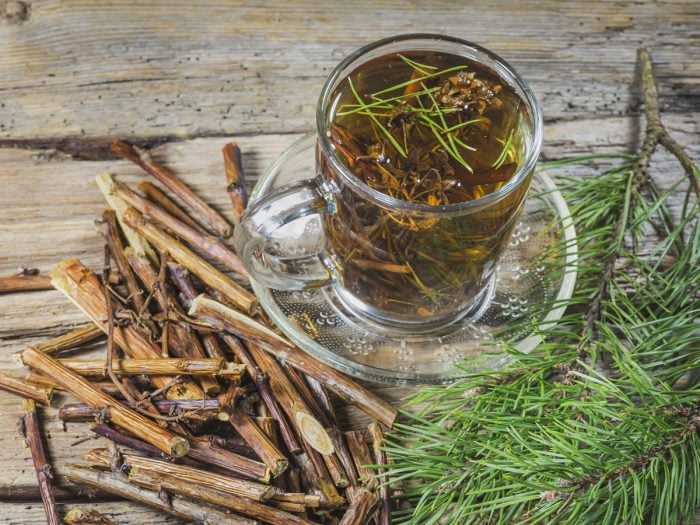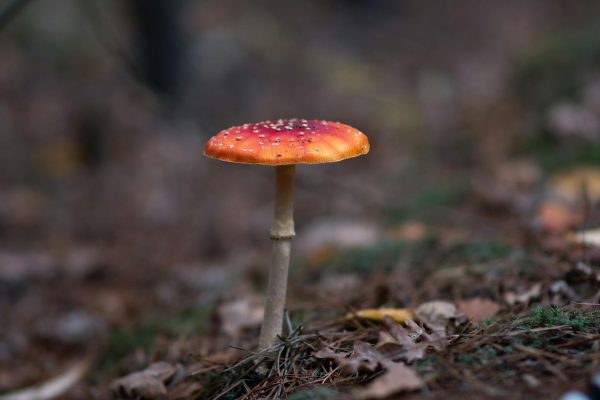The many benefits of pine needle tea may include boosting the immune system, improving vision, preventing respiratory infections, stimulating circulation, avoiding chronic disease, increasing cognitive performance, strengthening heart health, and speeding up healing.
With more than a hundred different types of pine trees in North America, you must use the appropriate type of needles for your tea; some types may contain toxins or have negative side effects.
What is Pine Needle Tea?
Pine needle tea has a long history of medicinal use. Though formal research is limited, anecdotal evidence suggests that it can be helpful for many conditions.
The trees are found in the Northern Hemisphere but now grow across many regions, from cold to tropical climates. Some cultures consume pine needle tea in the US and other countries.
How To Choose Pine Needles For Tea?
Pine needle tea is usually made from the fresh leaves of the eastern white pine, which have a woodsy fragrance and a citrusy flavor.
Although it’s easy to make from fresh, young pine needles and hot water, it is important to choose the right pine needles for safety. There are about 20 known toxic varieties of pine trees that contain substances that can be toxic when consumed.
Health Benefits of Pine Needle Tea
Pine needle tea has long been used as a remedy for respiratory problems. There are few long-term or clinical researches about its benefits, but there exist some written memoirs, encyclopedias, and folklore that describe its use by Native American and Asian cultures. Here are some of its top benefits:
May Be Rich in Vitamin C: Pine needle tea is believed to contain 4-5 times more vitamin C than orange juice. It was the traditional remedy for scurvy, which is caused by vitamin C deficiency. The Encyclopedia of Folk Medicine describes how Native Americans used pine needle tea to treat scurvy among the colonists.
A Korean study found that the antioxidant activity of pine needle tea may have been indeed similar to that of vitamin C. [5] [6]May Augment Vision health: Pine needle tea is also believed to contain vitamin A.
Together with vitamin C, it may help improve our vision. Vitamin C is good for aging eyes, giving it antioxidant protection against normal pollutants.
Vitamin A is essential for our cornea and in improving vision. May Help Cure/Manage Respiratory Conditions: Indigenous cultures often used white pine for its expectorant or decongestant qualities when treating
Side Effects
The effects of pine-needle tea are uncertain and there is not enough research available. Considering this, it should be used with caution. Some side effects include: [14]For pregnant women: The USDA cautioned against the ingestion of ponderosa pine needles. Given the toxicity of some pine species, it is best to avoid drinking this tea if you are pregnant. [15] [16]Allergy: You should also be aware of any potential allergies to pine trees. Pine which releases when brewing the tea may have inflammatory effects on the skin and stomach, resulting in stomach upset in some people. Given these possible side-effects, it is recommended that you only try about half a cup in the beginning.
There are a variety of pine trees which may be harmful when used for food. The needles from ponderosa pines, for example, may cause reproductive failure in cows. There is very little research available on the side effects of drinking pine needle tea, with most anecdotal evidence being related to pregnant women. Avoid drinking this tea if you are expecting. Allergic reactions to the pine oil used in making this tea are also possible, and might result in stomach upset or inflammation on the skin with some people.
There are many different types of pine trees; some of these can be harmful or toxic if ingested. When foraging for pine needles, it’s best to do so with an expert. According to the USDA Agricultural Research Service, pine needles from ponderosa pine may cause abortion when grazed by livestock. With limited research available, side-effects from drinking pine-needle tea are largely anecdotal. Some of these effects are:





